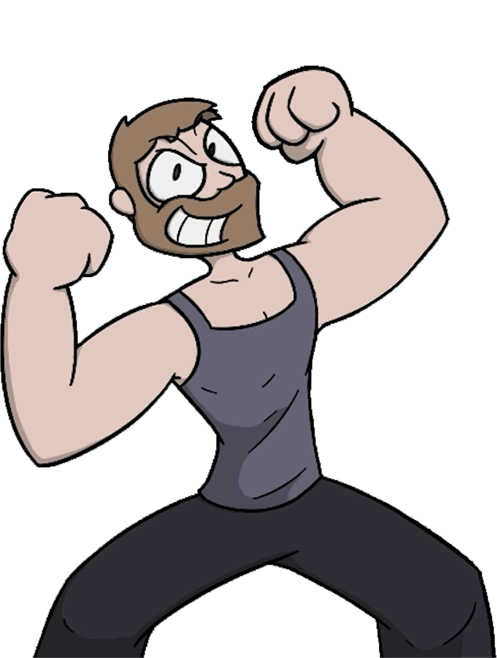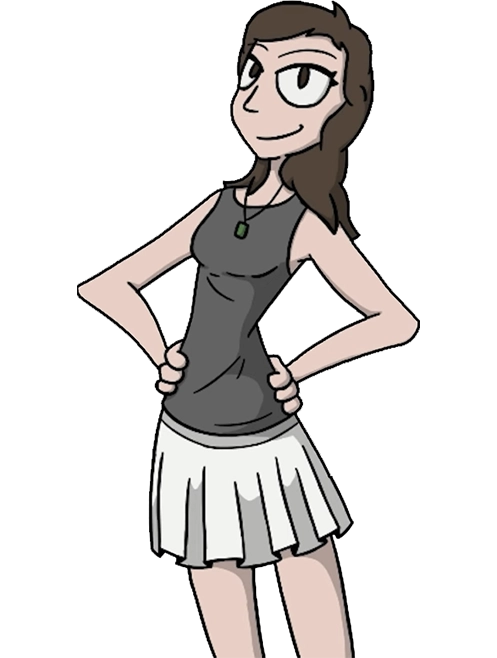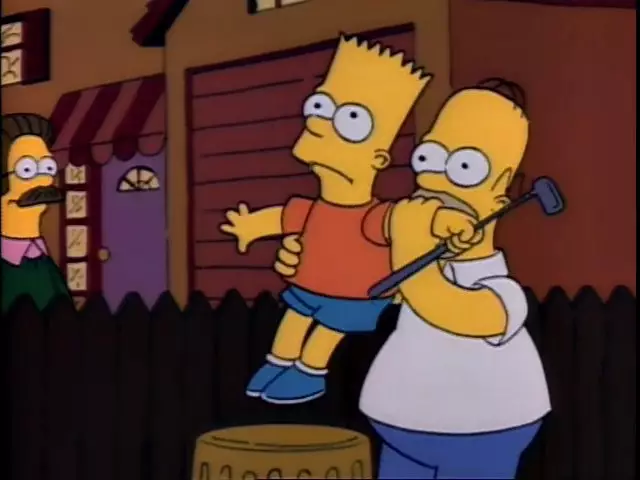My Recollection.
Hey, putt-putt, which is what mini golf was called in Brisbane for some reason. Brisbane’s smaller population means any novelty ideas like putt-putt come and go as they lack the constant numbers to survive. The only one I can think of that still operates in the Brisbane area is a windmill-free one at the local driving range. I actually quite enjoy it. “MY WIFE’S SUNDAY DRESS” was oddly specific to me as I’ve never been to church. A focus on the Flandereses.
There are two main spider archetypes: web and active. The prototypical latter is the Huntsman spider. It’s the one you’ll find in, or often under, Australian houses and makes up for a lack of core bulk with more hairy leg than a body positive book club. They’re otherwise harmless ghastly horrors who can move faster than you blink. The web ones shit a small house in the corner of yours and then just sorta hang out. The indoorsy ones are largely tiny and typically helpful in dealing with mosquitoes and flies, but the outdoorsy ones… Those are something else. Brisbane’s most common of these is the Golden Orb Weaver. I know them from when I used to live in Ashgrove.
The curb of Ashgrove road is lined with leafy trees. The houses that line Ashgrove road have front yards and these yards also feature leafy trees. The result is a footpath that’s little more than a concrete whisper of suburban safety drowned out by screaming green madness. At night, the street lights that were meant to provide a sense of daylight safety just acted as bait to lure you through the deciduous dark. And in that dark lurked the Orb Weavers.
You’d never see them. You’d only ever, were you the fortunate one walking a few steps behind, see the spasmodic panic karate of a human trying to simultaneously get out of a spiderweb while trying to figure out if the spider is still in it. The way you can tell the difference between a cockroach and a spider crawling on you is in the way they step. There’s a slow deliberateness to a web dwelling spider’s that typifies it from the mad scramble of the common roach. You will always tell yourself it was a cockroach, though, as the alternative invites the terrible idea that it could still be on you somewhere. Waiting, some say biding.
The local driving range was open at all hours because apparently golf people are fucking lunatics. I don’t know what sort of problems someone needs to have to see them whacking balls at 4:30 in the morning but by the looks of things I’ll stick to my poor person hassles. One thing I’ve noticed about the properly wealthy is that anything that affects them personally is an injustice they won’t stand for so the driving range, and by extension the putt-putt course, were licensed to serve booze from 5am which was about when we’d be finishing work. Our discovery of this would eventually ruin it for everybody but until then we’d roll up sometimes and get wankered while playing putt-putt. Surrounding the course were leafy trees and equally enthusiastic shrubs.
Sometimes, it was about the game. Other times, it was about the drinking. I was with a beanstalk glassy, and a giant manager who I’d already tapped out with a triangle lock on the 7th hole. Today was about the drinking. Frustration boiled over on the dastardly 15th and my manager whacked his ball off into deepest, darkest buttfuck, a cluster of bushes woven together by crisscrossing succulent protuberances, and he barrelled off after it. Another thing about the Golden Orb Weaver is that they cohabitate. Dozens will share a web that can span several meters and be thick enough not to see through from one angle yet be invisible from another. From my vantage, a hole ahead, I could see the unnervingly cumlike streak of sticky white nightmare. My manager couldn’t.
I first felt the difference between the speed of thought and the speed of consciousness when I saw my brother about to step on a huge dog turd but failed to warn him. The pieces are all there, but you only realise you knew them in retrospect. My manager pushed his way into the bush and the crew of my mind desperately screamed at a deaf captain. My first coherent thought, “fuuuuuuuuck” came when I saw a big dent hit the massive spider web and tear an otherwise patiently aloof coterie of now annoyed Golden Orbs away. To this day, I’ve never seen anyone else do anything like that. It’s nuts, a rule unwritten because it is so innate, like how you don’t expect to have to warn someone not to kiss a shark’s eye socket.
The bushes rustled.
I don’t think a written language exists that could render the sound I heard phonetically, I can only describe it as a terror yodel. A shrieking mound burst onto the green. This mound was a living combination of haphazard bush components and hollering drunkard held together with erstwhile spider palace and furious inhabitants. The screaming manbush hopped about slapping himself and screaming, “ORBS! FUCKING ORBS, CUNT!”
Had this scene occurred a few hundred years ago the event would have marked the birth of a new mythical forest imp or cryptid. Beware Tangled Bevan, children, he upset the Spider house and they cursed him to dance in town squares at night. His hooting draws people but should any touch him they become stuck and he dances them back to the Spider Queen to pay his debts. His sticky hooting can be heard on warm evenings in the towne of Bris’ Bane.
“Ooooooooooooooooooooooooorbs… Cuuuuuuuuuuuuuuuuuuuuuuuuuuunnnt”
I witnessed it myself and I’m still not sure.
The Episode
This story is a fantastic journey into the cosmic nightmare that is Homer’s existence. It’s him at his worst, but his worst in a way that lets us see into the motivations of his actions and those of his ilk. It’s the tragic flipside to his comic persona, something that can never truly grow so it manages the only change it’s capable of: inversion.
Homer is a buffoon.
The dramatic parallel of the buffoon is the oaf. An oaf is large, strong, dumb, and, above all, insecure. Their size or positions of power can never be enough because they are just smart enough to know they’re stupid or incapable of advancing and that makes them lash out with what creativity they do have, cruelty.
A buffoon may be as large and stupid, he may even cause the same amount of damage, but his well meaning imbecile stare and lack of basic agency rob any of his actions of cruelty. This is mostly Homer’s role, both because the show is a comedy but also because the utility of a loser to laugh at is thwarted if his alienating degree of stupidity is overcome by empathy for his ultimately miserable position. The audience has to identify with parts of him but the whole needs to remain closed off behind a wall of exaggerated traits. Season one dabbled in Homer as a person and the results were astonishingly bleak. As the series wore on, he nestled deeper into the buffoon role. Anything else will either veer into raw misery or become a character change that the series eternal status quo cannot allow, so his only other alternative is the oaf. This episode is a journey into the grotesque depths of pathetic insecurity of that oaf.
The amazing thing about an idiot as a character is that you can make them inconsistent and it won’t break the story world because the character’s stupid inability to understand their own inconsistencies is perfectly consistent. So Homer can be both a hardworking, caring father who’d do anything for his kids and a lazy thug who bullies them into competitions to fulfil his own selfish need to win something. What makes Homer a tragic character of near epic quality is that he’s just verging on smart enough to realise this. It is the kind of grim existential suffering one would expect as punishment from a particularly angry classical god. It also gives the audience a window into sympathy for the oaf, which is actually pretty rare.
Most narratives construct themselves thematically around punishing socially reviled traits and rewarding positive ones for a few reasons. Structurally, the themes have to parallel the narrative so there needs to be a sense of change with closure and this lends itself to moral conclusions. People look to fiction, its easy solutions and caught criminals, for a sense of justice that doesn’t exist in the real world and this necessitates the punishment of bad behaviour. And, ultimately, because audiences are dense pieces of shit who don’t like to be challenged. Neither of the first two rules are set in stone in any way, but the test audiences will hate anything else because open ended, ambivalent fiction, or anything where the bad guy just wins because it’s a cruel existence and fuck you, is essentially antithetical to the reasons people watch shit in the first place. If we wanted a cruel pile of unrelated events with no purpose we could just live our lives.
Homer is jealous of Flanders. This is a bad thing so he has to be humiliated. In order for his humiliation to be just and not unpleasantly cruel he can’t be sympathetically jealous so he has to be a villainous oaf. Because he’s a main character and needs to be able to shift back, he’s given moments where we can see into the oaf and experience a little sympathy for a bully. Homer’s complex nature, that of a spinning coin in a changeless void, give him the one thing an oaf never really has access to: introspection. Oafs (oaves?) can gain insight, but it is typically a one way character development from oafism to some form of redemption. Homer cannot be redeemed so we are left with his Idiot Zen existing as both Idiot and Zen, interacting but separate.
The line,
“Because sometimes the only way you can feel good about yourself is by making someone else look bad. And I’m tired of making other people feel good about themselves.”
is both a comic treat of wordplay and a level of insight that’s usually toxic to an oaf. When you’re a shit person who makes other people’s lives hard, insight becomes impossible as the thing you see hurts you. The oaf is trapped in a prison of being a loathsome cunt where the key to its freedom is so hot it’s burns to touch. This line is like someone punching you in the face while saying, “sorry, I had a difficult childhood”. It’s a level of insight that should at least begin to confront the behaviour. The, “admitting you have a problem” part of the journey of the self. It’s Zen answering a question Marge asked the Idiot, but they pass each other like strangers.
One time I visited one of my bullies’ homes and their couch was the back seat of a Toyota. It was just there in the lounge room. The back seat of a car. An axle with cardboard was the coffee table. Now that I think of it, I get the feeling the entire place was, in some way, furnished by a wrecked car. When you’re dumb and miserable, happy people are living claws in your soul, and you can’t make yourself happy but you can make them feel bad or, better yet, look worse. The tragedy is the unspoken, and funny, part of the word play. “I’m tired of making feel people feel good about themselves” is a passive plea whereas any form of “I want to feel good” would be an active demand. It’s the Toyota car seat, the note of sadness that explains everything. Homer feels bad all the time and he’s just smart enough to know he’s basically the “there” in everyone else’s “there but for the grace of god go I”. All he wants is to feel what he sees everyone else feel.
Humans can live in unbelievably shitty circumstances without complaint provided they don’t see, or are otherwise distanced from, a possible alternative. Monkeys given asymmetric reward treats are fine until the poor loser getting stiffed is shown he’s missing out and then he goes batshit. This sense of exclusion is strong and ignores reason. FMRI scans show your pain receptors light up whether your exclusion comes from people you like, people you hate, or from people being rewarded for work you didn’t do. Flanders and his family are the perfect knife to twist into Homer. Throughout the series, he can cope with a lot. But Flanders always gets to him.
I got punched in the face for using faggot words by a person whose home was furnished like we were already in Mad Max. In this, you can understand Homer’s outburst at Flanders. He’s still a giant, barely sapient cunt, but far too often the behaviour of people is dismissed as the unfathomable mania of the underclasses. There’re reasons to all of it. Even Homer’s embarrassed by his outburst. Under questioning from his wife, the logical part of his brain can’t find the reasons his feelings had.
His brief glimpse of how shitty he is is just more torture so he becomes desperate for any relief, Bart’s apparent talent for mini-golf is that relief. When you spend most of your time drowning in your own stupidity, any moment when your head is above water is a blessing. Homer’s Idiot Zen is less a coherent worldview and more a messy coping mechanism given form by the boundaries of his universe. His dreams are seconds on dessert because he’s taught himself that anything more is foolish hope. Hope is the most important part of suffering, it’s the reprieve that keeps you from acclimatising, and it’s something so alien to him that when a realistic one appears it intoxicates him.
His fear of losing his one guilty hope is present in his entire approach to the competition. Aggression and hate are the only things it even occurs to Homer to impart to Bart. Hate the picture. Think of the putter as a gun. Win or you’re out of the family. The mania of a cornered animal. The oaf lashing out. And the oaf must be punished.
Wrapping Bart up in this is a good split of the tension. If Bart wins, the oaf is rewarded. If the oaf is punished, then so is the otherwise innocent Bart. This along with the incredibly in character line, “The father of the boy who doesn’t win” sets up for a good finale and lesson on the self. Bart and Todd eschew the shiny rewards of competition for inner peace. Homer demands his punishment, but his shame and rage make him the only one who suffers as Flanders relaxes into the spectacle. The oaf’s socially reviled traits are punished and the vector of that punishment is entirely his inability to let go of hate and fear. This lends it a cosmic justice that a simple loss would have lacked.
On the secondary characters, Lisa and Flanders both get a fair look in with Bart having a few moments in spite of being a pawn and Todd having probably the most actual story he’s ever had.
Flanders’ happy life is the perfect counterpoint, and torture, for Homer but it’s a fundamentally false happiness. There is little to Flanders, even in these early stages, that is his and not the result of his faith. His calm comes from an external structure that he has abdicated his own mind to. Like most of the religious, it’s not even his God that serves as the actual source of his strength but the long-suffering mortal, Reverend Lovejoy, who loses pieces of himself so Flanders can function. We get a glimpse into this parasitic relationship in this episode with the first of Flanders’ annoyingly pointless calls.
That said, we do see some other, actual human behaviours. Homer gets him mad several times and we won’t see that again for a while. Like Todd’s being an actual human boy, I’m so used to the alternative that it’s these earlier examples of actual humanity from him and his father that feel out of character. It’s automatic to assume the later forms to be degradations from their earlier and thus truer selves. But while their ultimate fate is deranged parodies of themselves, that is also the fate of the entire show. Characters in early seasons often change as they grow into their definitive selves, like Zoidberg becoming the cast’s psychic toilet in Futurama, and I lean toward that here.
Lisa is in fine form this episode as she becomes Bart’s Master. She far-too-easily takes on responsibilities beyond her age in the face of Homer’s malicious incompetence. This and the line, “It’s times like this that I’m glad dad has little to no interest in almost everything I do” are small apertures that provide a much larger look into the realities of living under substandard parents. The mixed blessing of the grimness of the situation coupled with the strength to survive and even thrive in spite of it. Lisa is strong, but it comes from something very sad.
This is an episode of Bart being a normal boy I’d forgotten as it is far more understated. He has significant focus but it’s only as a function of Homer’s story. As he himself says, he is a pawn. But as a pawn he can exist without the constraints of narrative focus and the character tropes those force. Homer is both villain and main character here so there is nothing left for Bart to do but be a 10 year old boy forced into competition by a zealous father. But his journey into zen is like most of his other personal growth, a temporary thing that ends when the episode does.
Dead Putting Society is a great character episode with a tight internal structure that the series has largely been lacking. There’s no hanging plot threads or baffling holes, the narrative, themes, and characters all interact to create a tight web that leads to a satisfying conclusion. It’s a slow burner of an episode whose memorable moments are the kinds of small and subtle ones you can miss on a single viewing. The story is singular, but it is woven with other characters and moments in natural ways that really show how lazy other story shifts can be.
Homer is a vile oaf who gets his comeuppance but we get an insight into the sad mind of one, even if it has to come via the words of a nerd writer.
Yours in describing this all to a psychiatrist one day, Gabriel
Jokes, lines, and stray thoughts.
There’s an amusing gap between Bart’s “still just a potato”, implying that he’s a poor student, and his use of obscure ditto marks.
Homer is probably right about Elf Grass.
Homer noticing Maude’s butt is the start of a long running thing where he is clearly attracted to her.
“Beggers can’t be choosy”, “Too bad we don’t live on a farm” (in response to a free protractor), and “Jack Nicholson himself couldn’t make it” are great examples of Homer’s general ignorance that used to be threaded throughout his lines. The kinds of little mistakes that suggest only a superficial grasp or misunderstood point that better fill out the kind of dumbass Homer is. He knows of these things but not enough to get them quite right.
Bosom is a hilarious word in general and takes on added humour when used in the archaic form for general chest and not specifically a full titty. Flanders’ sound when he is caught delivering the letter is also pretty funny.
Hey, here’s a journey into the past, Lisa goes to a fucking library to research putting! A fucking library! You had to get up, put on pants, go to a building that had hours, go to a catalogue that was a piece of furniture filled with paper, walk to where the books were supposed to be, hope they were actually there, and then take the books home before you could get an answer to your question. I’ve looked up a vast quantity of putting tutorial videos in YouTube while I was writing this, and I’m still covered in chocolate from shame-eating a sweetened Christ-Rabbit in the middle of the night.
The process of naming the putter is funny. Bart engages in this process with the enthusiasm of a cat being walked on a leash. Mr Putter is delightfully comic zero effort only to be topped by “Mom” when Homer demands a female name. It’s a good one-two but both lefts and the second hits harder for some reason. It hides a second layer of absurd in an even less expected fashion multiplying the effect.
A weird sighting of make-up free Krusty in the pool hall.
Bart whacking the ball, hitting the gorilla, and nearly hitting Homer is a well constructed moment. Shot, shot, shot/sound, sound, sound and then the final shared shot of the pair looking at each other. It’s a small but nifty example of how balancing elements creates good scenes.





4 replies to Dead Putting Society
Alex on 3rd April 201803 Apr 18 said:
Loved this write-up. Some of the lines that seem to be throw-away jokes in these early episodes really do carry bigger connotations for the characters, and it seems to drop off pretty sharply after a point in favour of more one dimensional jokes (I couldn't pin point when, I'm not doing a series of analysis). It's the sort of thing I'd never really noticed on my own until it's pointed out, and the lack of them later on does make for a different feel.
The one paragraph about audiences not liking being challenged by their entertainment bucking the usual standards of narratives makes me immediately think of I Am Legend, when test audiences complained about Will Smith making peace with the mutants at the end. Still baffles me to the day, but then again, test audiences.
I maintain that, should you and Aaron do another versus series, the punishment should be the loser having to mow the winners lawn wearing a dress.
No one on 10th April 201810 Apr 18 said:
This was a fascinating read.
No one on 10th April 201810 Apr 18 said:
I'm serious by the way. I don't like putting my name online so I put the first thing that came to mind, and after I posted it it occurred to me that using "no one" could be taken like "Said no one ever"
But I really, really enjoy these write-ups. I'm not THAT into The Simpsons, but I had no idea the depth you could delve into in some of these episodes.
Seriously, well done on the write-up.
Gabriel on 10th April 201810 Apr 18 said:
There's depth in almost anything and I encourage people to look for it in whatever thing or hobby consumes them.
Comment on Dead Putting Society
To reply, please Log in